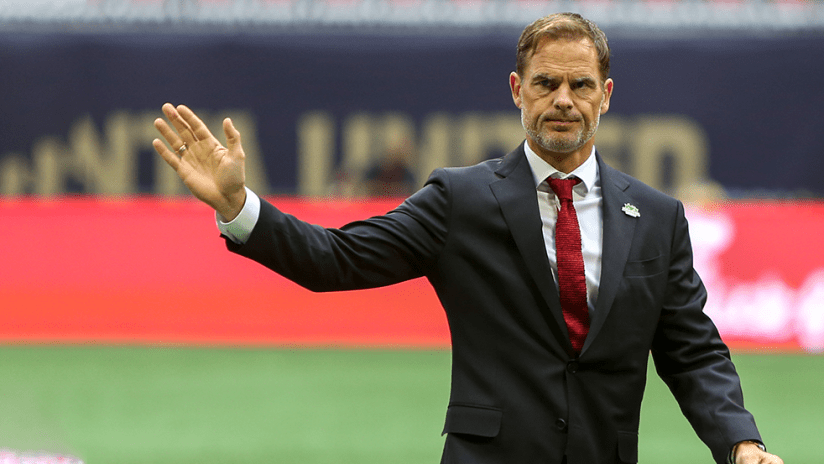Most Atlanta United supporters are probably still trying to process what they witnessed on Thursday morning during one of the most brutal losses in the club’s history: the 1-0 defeat to FC Cincinnati that has the Five Stripes on the verge of elimination in a Tournament group they were favored to win.
The hot takes and knee-jerk reactions from #ATLUTD Twitter were unhinged in the hours that followed, but if you waded through it all, there are a few overwhelming sentiments that come through.
The game was one of the worst to occur in MLS in a long time. And while it was arguably the biggest win during FC Cincinnati’s time in MLS — their US Open Cup run in 2017 as a USL club proved vital ahead of their move to MLS — it was probably the lowest point for Atlanta since Chicago put four past them in the first half last year.
This Atlanta United team looks like it has some major issues to solve.
There are clearly plenty of extenuating reasons that might lead you to just dismiss all of it: No Josef, a 9 am start time, not enough playing time to integrate new pieces effectively, Florida heat, an early red card and a collection of not-quite-as-bad-but-still-bad performances from other favorites in this tournament are all entirely fair counterpoints.
But that doesn’t change the fact that for Atlanta United fans, this game was the monster from “It.” The entire thing assumed the form of their biggest fears.
Concerns about Frank de Boer’s tactics, especially with regard to the aesthetics of those tactics, have been maybe the most present complaint in the Atlanta United fan base over the last year and a half. Even the biggest defender of de Boer would have to admit that the Cincinnati match was dire. And the team looked sluggish even before the early red card. Atlanta came out as flat as can be against Cincinnati, which calls into question De Boer’s ability to motivate his squad for a game they had to have after the opening match loss to RBNY.
Not a single player looked solid and Pity Martinez, who had begun to sway public opinion on his performances in late 2019 up until now, may have been the most noticeably subpar player on the field. At one point Atlanta subbed out Adam Jahn for Edgar Castillo, only for Castillo to get subbed off later in the same game. Yikes.
Can Atlanta meet their own standard?
Everything about the game was objectively bad for Atlanta, but the question is whether this will prove an outlier where this team hit its low point, or whether the games in Orlando are an indication that it may be time to lower the high ceiling set for the club.
Even if the loss to Cincy isn’t the canary in a coal mine, the style points that Tata Martino’s team regularly earned don’t seem like they’ll be back anytime soon.
The initial success of the club under Tata — winning and doing it in style — has created a heavy weight of expectations. And they’re expectations that De Boer and the club are very aware of. They set them themselves.
“We are Atlanta United and we’re supposed to win games,” De Boer said after the loss to Cincinnati. “We want to entertain our audience. That’s our DNA. We have to understand that’s our responsibility. Even though maybe it wasn’t the perfect preparation for this tournament, you have to pressure to win all games. If you are involved with a club like Atlanta United then you have to feel that pressure. We feel that always. A draw is like a loss. So two losses, our supporters and our players don’t want it and we have to change it quickly.”
De Boer found a way to make changes in 2019 and dig the team out of an early-season hole in a year that ended with wins and trophies. But the results were of the efficient variety, based on finding the right tactics for the group of players he had at his disposal.
But Darlington Nagbe is gone, Julian Gressel is gone, Leandro Gonzalez Pirez is gone and Tito Villalba is gone. While there are different circumstances regarding each of those departures, the changes mean that De Boer has to start from scratch and figure out his best team and the tactics that fit.
The new players that were brought in have yet to offer much to be excited about and Atlanta has looked mediocre to downright poor in the four games played thus far. Four games is not a big sample size, especially when those four games were separated by four months due to a global pandemic. Still, those new players will need to start performing soon to prevent more serious questions being asked about the club’s player recruitment decisions.
The ethos of the team’s electric first two seasons is still there. But it’s obvious that from an aesthetic, “we want to entertain our audience” perspective, the execution of that ethos has been lacking in 2020. If the results stop coming entirely, if there’s no mid-season turnaround that inspires a sudden boost of morale, if the new signings never come to fruition, Atlanta will be faced with the task of needing to restore the culture of a club that thrilled the league in its first two years.
But that’s a lot of ifs. Atlanta United as an organization will, rightly, be patient, just like they were last season. But, as De Boer said, things have to change quickly.













